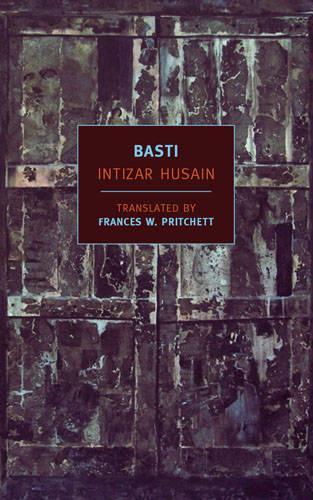
Basti
(Paperback, Main)
Publishing Details
Basti
By (Author) Intizar Husain
New York Review Books
NYRB Classics
15th November 2012
15th February 2013
Main
United States
Classifications
General
Fiction
891.43937
Physical Properties
Paperback
258
Width 128mm, Height 202mm, Spine 12mm
255g
Description
"Intizar Husain is one of Pakistan's-and South Asia's- greatest living writers. Basti, a haunting modernist echo chamber of voices from Hindu, Buddhist, and Islamic traditions, unflinchingly depicts contemporary political violence in prose that is suffused with a deep nostalgia for a much less tormented age. Basti is a transformative vision of both present and past." -Pankaj Mishra Basti is a beautifully written reckoning with the tragic history of Pakistan. Basti means settlement, a common place, and Intizar Husain's extraordinary novel begins with a mythic, even mystic, vision of harmony between old and young, man and woman, Muslim and Hindu. Then Zakir, the hero, wakes to the modern world. Crowds gather. Slogans echo. Cities burn. Whether hunkered down with family or furtively meeting to exchange news with friends in cafes, Zakir is alone in a country lost to the politics of loneliness. "Intizar Husain is the most important writer of fiction in Urdu, the strangely homeless language produced out of interactions between the vernacular of north India and those of the Islamic Near East, Persian and Arabic in particular. In Basti he has produced a novel of epic ambition: a swirling storm of historical moments, scriptural traditions, and ancient mythologies, all harnessed around the convulsion of India's partition along religious lines. By taking us through the internal life of his protagonist, Zakir-'He who remembers'-Husain performs an act of civilizational memory and provides us with the fragments of a culture's history that modernity has firmly set on the road to oblivion." -Aamir R. Mufti
Reviews
'At its best Basti is deftly written and transalated ... one can see why Husain is regarded as one of Pakistain's finest writers and is nominated for this year's man Booker International Prize.' Times Literary Supplement 'sensuous reworking of vernacular modes, and his intricate metaphysics, are effectively deployed in his novel. This trademark use of what might crudely be termed magic realism adds not just a dimension of timelessness and universality, but also a subversive exoticism that foreign readers might find seductive long after the topicality of contemporary fiction from Pakistan recedes.' The Independent
Author Bio
Intizar Husain (b. 1923) is a journalist, short-story writer, and novelist, widely considered the most significant living fiction writer in Urdu. Born in Dibai, Bulandshahr, in British-administered India, he migrated to Pakistan in 1947 and currently lives in Lahore. His other titles in English include Leaves, The Seventh Door, A Chronicle of the Peacocks, and An Unwritten Epic. Frances W. Pritchett has taught South Asian literature at Columbia University since 1982. Her books include Nets of Awareness: Urdu Poetry and Its Critics, The Romance Tradition in Urdu: Adventures from the Dastan of Amir Hamzah, and (with Khaliq Ahmad Khaliq) Urdu Meter: A Practical Handbook.
